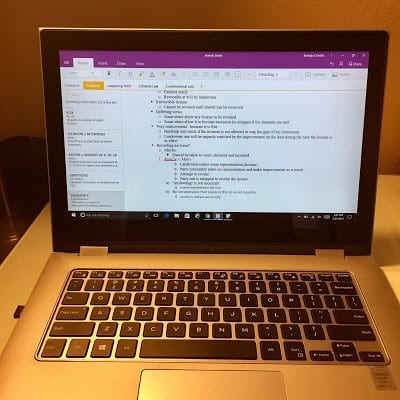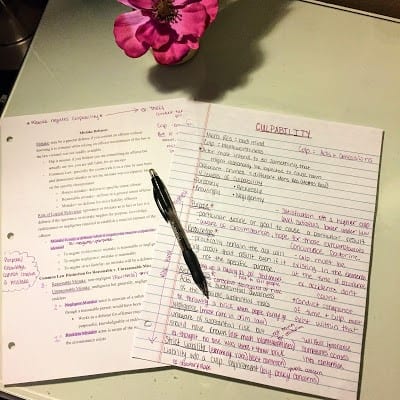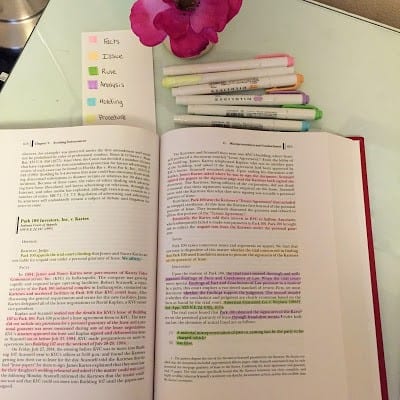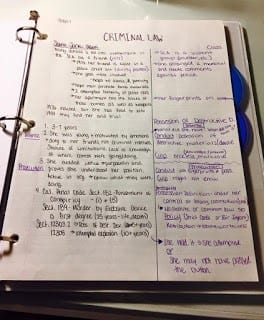Guest Blogger: Brandy Brown, The Legal Duchess
Brandy Brown is a second-year law student at the University of Toledo College of Law, where she attends on a full tuition scholarship. Prior to law school, she earned dual bachelor’s degrees in legal studies and history. She is currently interning at her local criminal prosecutor’s office and plans to pursue a career in criminal law after graduating and passing the bar. Before starting law school, Brandy launched The Legal Duchess — a blog to document her law school experience… Read More
Notes… Seems like half my life during law school is spent taking notes. Reading notes, class notes, notes on how to outline, notes of how to study, notes on internship searching. It never ends. One of the pros to this — I have gotten extremely good at my notetaking system.
Free Downloadable PDF: The 1L Law School Supplies Checklist
I have always been an avid notetaker. From high school to undergrad, I never went through a class without taking notes. Generally, I have always preferred to take handwritten notes, given that it has been scientifically proven that handwriting helps information retention. Once I started law school, I knew my notetaking was going to need an overhaul. After two semesters of law school, here is what I have learned as the best notetaking strategies for law school.

COMPUTER NOTES
As I have spent more time in law school, I have slowly become more used to taking computer notes. Thankfully I have a nice light laptop that is easy to carry to and from class. Here are my Pros and Cons to taking notes on the computer.
Pros:
- Some professors go so fast through such volumes of information; typing is the only way I can keep up.
- Other times, I am taking notes through a worksheet the professor emailed out and it is just easier to fill in on the computer.
- Computer notes are clean and organized, and you adjust the placement of information and have more flexibility.
Cons:
- It is easy to get distracted on the internet.
- Typing notes does not promote the same level of retention.
- Typed notes are harder to review after the fact.
I took computer notes in two classes for several reasons: Because the professor went too fast for me to be able to handwrite and because I filled in an outline that the professor emailed us to use before each class. I also tend to take reading notes on my computer and print them out to fill in with class notes. My sole reason for doing this is because I am OCD and I prefer a nice organized sheet of notes.
When I take notes on my computer, I use Microsoft OneNote. This program is great because I can make multiple folders for each of my classes and within the folder, multiple tabbed sheets for each different day/topic in class. This program saves continuously so I never worry about losing my work, and it syncs continuously between my computer, my iPad and my phone so I have everything I need no matter where I am. It has many text options and you can even draw within it if you need to diagram. It is the bomb.com.
One thing I do not like about taking computer notes is how easy it is for me to become distracted by emails and Facebook. I try hard not to, but sometimes it happens. You must have a lot of self-control when taking computer notes. Another thing that I don’t like about computer notes is when it comes time to review — I must print them out because I just can’t read on the computer screen (it gives me a headache).
All pros and cons aside, computer notes are a key way I take notes during law school and something I do suggest for law students in general.

Learn Notetaking, Outlining, Exam Taking & More This Summer. Enroll Today ➞
HANDWRITTEN NOTES
I currently take handwritten notes in three of my classes. One class has a “no-laptop policy” professor so I do not have a choice. In the other two, it is all my idea.
Pros:
- Easy to customize/make them exactly how you need them
- Scientifically proven to help with retention
- Less distractions
- Lots of color-coding options, easy to customize
- More focus because I am steadily writing
Cons:
- Hand cramps
- Can’t easily add things in later to previous areas
- Can be hard to keep up in fast-paced classes
- Not always as pretty
I like to do my handwritten notes on a nice, thick, reinforced loose-leaf paper so I can add reading notes to class notes and add a page if I need to fill in. I think loose-leaf paper in a binder provides more flexibility than a notebook. I use a variety of pens in a wide variety of colors. These Pilot G-2s are my favorites (SO smooth), closely followed by these Papermate InkJoys (don’t bleed!!) and I also love a good Sharpie Pen. I also keep sticky notes, tabs, a white out EZ corrector and highlighters in my pencil bag to keep my handwritten notes organized and in tip-top shape.
Personally, I like handwriting my notes when possible. I think it does help with retention and I love to color code the crap out of my notes. Although, it can be frustrating when you write something and then later the professor adds on to it and you have nowhere to put that (hence why I carry sticky notes). Overall, in my tougher classes I tend to gravitate toward handwriting my notes for utmost retention. You never want to count out handwriting as an option because many professors do not allow laptops and you will have to handwrite. It is just one of those skills that never goes away.
Additional Law School Notetaking Skills
Law school has certainly changed my notetaking skills beyond just handwritten v. computer. I have learned to case brief, IRAC, incorporate reading and class notes, outline and book brief.

Case Briefs/IRAC/Book Brief
Some people write out full case briefs for every case they read. This involves something you will later become very familiar with: IRAC – Issue, Rule of Law, Analysis and Conclusion. When taking exams, IRAC is the suggested structure for your answers. A great way to get into that habit is by briefing each case in that style. I do not write out a brief for each case, but I do book brief; that means I highlight in my book with a different color for each part. This way in class, I just look for pink to find the facts, green for the rule of law and blue for the holding/conclusion. However, I wrote out full case briefs for my Constitutional law class because the cases were so heavy and I wanted to improve my issue statements for spring exams. Everyone is different — I know lots of people who brief every case and lots of people who book brief.

Reading Notes + Class Notes
Not everyone takes reading notes but they really are helpful. My tactic second semester was to take reading notes either handwritten or on the computer on half a page. I left sufficient space to fill in with class lecture notes. By doing it this way, all my notes — reading and lecture — are together in the same spot, instead of having reading notes and then the same topic from class several pages later. I find this system to work very well because I can see exactly what I am missing in my reading compared to what is gone over in class. Come outlining time, everything is organized and ready to go. I also print any class PowerPoints and place them with the notes for that day/topic. All of this goes into a binder with tabs for each new topic. Trust me, an organized binder makes for a much easier time when outlining.
Flashcards
I make flashcards as we go along of rule statements, definitions, element lists and pretty much anything that requires memorization. I keep everything in a big flashcard box and take it everywhere. That way, I can flip through them and work on my memorization whenever I have a spare minute. I find that writing out the flashcards alone is great for retention. Just the act of writing out the words puts it into your brain one more time, and reaffirms the concept.
Outlines
Outlining is an integral part of law school success. Basically, an outline is an overview of the whole semester’s material pared down to the most important information. This will be what you study/memorize for exams. Because it is so important, I am going to devote a whole post to it later.
So there you go — pretty much all the nuances of my note taking system for law school. From handwriting notes, to OneNote, reading notes and outlines, law school is simply chock full of notetaking. My best advice is to find a system that works for YOU and YOU alone. Do not try to do what everyone else does just because you think that is the “right” way. There is no right or wrong way. There is just your own system and what works best for your learning.
Free Access: Start Watching the Navigating Law School Video Series Now


